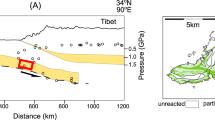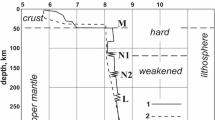Abstract
LEE et al.1 demonstrated the effect of temperature on the electrical conductivity of high grade saturated metamorphic rocks, when held at constant effective pressures. Apart from initially showing an increase in conductivity with temperature, it was demonstrated that conductivity at higher temperatures was time dependent. When a sample was held at a constant temperature (≃250 °C) the conductivity decreased exponentially with time, so that after ∼10h, there was little further change observed. As the temperature was lowered the conductivity decreased from this steady state value, and with further thermal recycling the conductivity was recycled along a path quite different from that taken with the initial temperature increase. The results implied that due regard should be paid to this transient effect when making laboratory electrical measurements on rock samples in simulated upper crustal conditions. Time-dependent effects at elevated temperatures have also been observed in laboratory measurements of compressional wave velocities2,3. Spencer and Nur2 in their study of the Westerly Granite showed that thermal recycling at elevated pressures tended to produce an irreversible increase in compressional velocities. Further investigation demonstrated a systematic time-dependent increase of velocity while the sample was held at a fixed elevated temperature (495 °C). We report here the direct comparison of these transient variations of electrical conductivity and compressional velocity. In our experiments we have measured these parameters simultaneously on the same sample to ensure that any variables such as pore pressure, confining pressure and temperature are identical. Any comparison of separate measurements of conductivity and velocity on the same sample in different experiments is unsatisfactory due to the irreversible nature of the process being studied. Even if two samples from the same rock are used there may be significant differences in cracks and mineralogy, which would give erroneous results.
This is a preview of subscription content, access via your institution
Access options
Subscribe to this journal
Receive 51 print issues and online access
$199.00 per year
only $3.90 per issue
Buy this article
- Purchase on Springer Link
- Instant access to full article PDF
Prices may be subject to local taxes which are calculated during checkout
Similar content being viewed by others
References
Lee, C. D., Ross, R. G. & Vine, F. J. Nature 266, 44 (1977).
Spencer, J. W. & Nur, A. M. J. geophys. Res. 81, 899–904 (1976).
Stewart, R. & Peselnick, L. J. geophys. Res. 82, 2027–2039 (1977).
Murrell, S. A. F. Geophys. J.R. astr. Soc. 14, 51–55 (1967).
Walsh, J. B. J. geophys. Res. 70, 381–389 (1965).
Brace, W. F., Orange, A. S. & Madden, T. M. J. geophys. Res. 70, 5669–5678 (1965).
Author information
Authors and Affiliations
Rights and permissions
About this article
Cite this article
EVANS, C., LEE, C. & CHROSTON, P. Transient effects in laboratory measurements of compressional wave velocity and electrical conductivity. Nature 276, 485–487 (1978). https://doi.org/10.1038/276485a0
Received:
Accepted:
Issue Date:
DOI: https://doi.org/10.1038/276485a0
Comments
By submitting a comment you agree to abide by our Terms and Community Guidelines. If you find something abusive or that does not comply with our terms or guidelines please flag it as inappropriate.



